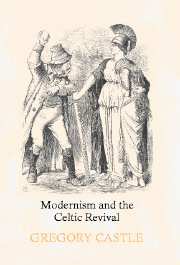Book contents
- Frontmatter
- Contents
- Acknowledgments
- List of abbreviations
- 1 The Celtic muse: anthropology, modernism, and the Celtic Revival
- 2 “Fair equivalents”: Yeats, Revivalism, and the redemption of culture
- 3 “Synge-On-Aran”: The Aran Islands and the subject of Revivalist ethnography
- 4 Staging ethnography: Synge's The Playboy of the Western World
- 5 “A renegade from the ranks”: Joyce's critique of Revivalism in the early fiction
- 6 Joyce's modernism: anthropological fictions in Ulysses
- Conclusion: After the Revival: “Not even Main Street is Safe”
- Notes
- Select bibliography
- Index
2 - “Fair equivalents”: Yeats, Revivalism, and the redemption of culture
Published online by Cambridge University Press: 24 November 2009
- Frontmatter
- Contents
- Acknowledgments
- List of abbreviations
- 1 The Celtic muse: anthropology, modernism, and the Celtic Revival
- 2 “Fair equivalents”: Yeats, Revivalism, and the redemption of culture
- 3 “Synge-On-Aran”: The Aran Islands and the subject of Revivalist ethnography
- 4 Staging ethnography: Synge's The Playboy of the Western World
- 5 “A renegade from the ranks”: Joyce's critique of Revivalism in the early fiction
- 6 Joyce's modernism: anthropological fictions in Ulysses
- Conclusion: After the Revival: “Not even Main Street is Safe”
- Notes
- Select bibliography
- Index
Summary
We may go mad some day, and the enemy root up our rose-garden and plant a cabbage-garden instead.
W. B. YeatsIn recent years, Yeats studies have witnessed a turn toward the politics of cultural production that is neatly epitomized in the title of Ann Saddlemyer's selection of the letters of Yeats, John M. Synge, and Lady Augusta Gregory: Theatre Business. As these letters attest, the principal Revivalists, in addition to penning works of extraordinary literary merit, at the same time ran a complex and often volatile business. Adrian Frazier and R. F. Foster, among others, have filled in the historical context of these letters, establishing beyond reasonable doubt that Yeats was the prime mover (for good or ill) behind the scenes of the various incarnations of the Irish Literary Theatre. Especially important is Foster's W. B. Yeats: A Life, which plainly indicates the depth of Yeats's commitment to Revivalist ideas and strategies and his willingness to modify them, especially after the meteoric success and early death of Synge. A related trend is the analysis of Yeats's “political identities” and the complex relationship between Yeats and nationalism. It is significant that critics now speak of multiple political identities, for one of the things that new historical criticism has yielded is a more refined sense of Yeats's nationalist affiliations and loyalties which were, as I have suggested in the introduction, complicated by his Anglo-Irish background.
- Type
- Chapter
- Information
- Modernism and the Celtic Revival , pp. 40 - 97Publisher: Cambridge University PressPrint publication year: 2001



